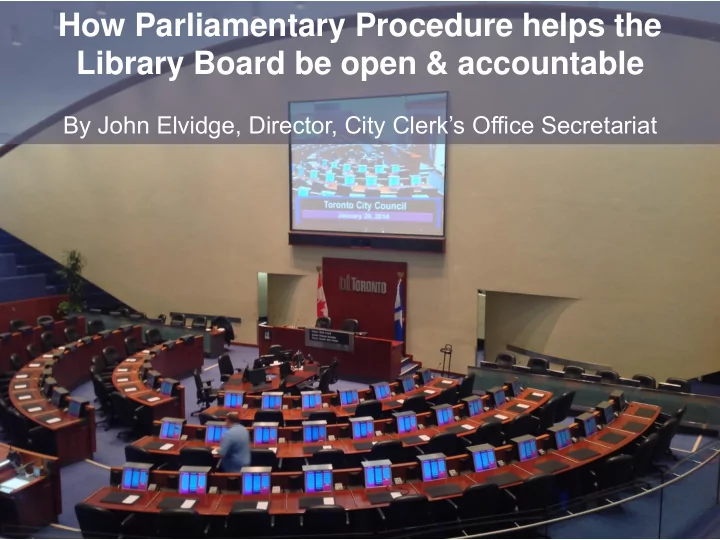

How Parliamentary Procedure helps the Library Board be open & accountable By John Elvidge, Director, City Clerk’s Office Secretariat
Public appointees play a valuable role in the governance of City boards Thank You!
Parliamentary procedures are often considered confusing or arcane
Modern procedures are rooted in time- 1 honoured principles
John George Bourinot • “The great principles that lie at the basis of English parliamentary law have … been always kept steadily in view by the Canadian legislatures; these are: • To protect the minority and restrain the improvidence and tyranny of the majority, • to secure the transaction of public business in a decent and orderly manner, • to enable every member to express his opinions within those limits necessary to preserve decorum and prevent an unnecessary waste of time, • to give full opportunity for the consideration of every measure, and • to prevent any legislative action being taken heedlessly and upon sudden impulse”.
Mason’s Manual of Legislative Procedure • Body must have authority to act • Body must make decisions in meetings • Proper notice must be given to all • Quorum must be present • There must be a question upon which the body can make a decision • Must be an opportunity for debate • Question must be decided by a vote • Majority is required to decide a question • No fraud, trickery or deceptions • Actions must be lawful and constitutional
Principles of the City of Toronto Council Procedures • The majority has the right to decide • The minority has the right be heard • All members have the right to information to make decisions, unless prevented by law • Members have the right to an efficient meeting • Members have the right to be treated with respect and courtesy • Members have equal rights, privileges and obligations
A procedures by-law is part of a larger 2 procedural framework Statute Procedures By-Laws Parliamentary Authority Custom Rulings Policies
Statutory Provisions • A board shall hold regular meetings once a month for at least 10 months each year and at such other times as it considers necessary • The chair or any two members of a board may summon a special meeting of the board by giving each member reasonable notice in writing, specifying the purpose for which the meeting is called. • The presence of a majority of the board is necessary for the transaction of business at a meeting. • The chair or acting chair of a board may vote with the other members of the board upon all questions, and any question on which there is an equality of votes shall be deemed to be negative. • The board chair may expel any person for improper conduct at a meeting.
Procedure by-laws are part of a larger procedural framework Statute Procedures By-Laws Parliamentary Authority Custom Rulings Policies
Pay attention to open and closed meeting 3 rules
There is growing public scrutiny of open and closed meetings
There is a narrow list of reasons that meetings can be closed Reasons a meeting may be closed: • the security of the property of the board; • personal matters about an identifiable individual; • a proposed or pending acquisition or disposition of land by the board; • labour relations or employee negotiations; • litigation or potential litigation, including matters before administrative tribunals, affecting the board; • advice that is subject to solicitor-client privilege, including communications necessary for that purpose; • a matter in respect of which a board or committee of a board may hold a closed meeting under another Act.
The Public Libraries Act imposes some conditions on closed sessions • A meeting must be closed if the Board is exercising the powers of the head of the institution in an MFIPPA matter • Before holding a meeting or part of a meeting that is to be closed to the public, a board or committee of the board shall state by resolution, • the fact of the holding of the closed meeting; and • the general nature of the matter to be considered at the closed meeting. • A meeting shall not be closed to the public during the taking of a vote. • A meeting may be closed to the public during a vote if the vote is for • a procedural matter or • for giving directions or instructions to officers, employees or agents of the board or committee of the board or persons retained by or under contract with the board.
Avoid some common mistakes Pre-meeting Going for lunch Board “retreats” briefings for or dinner board Recessing to ask Telephone or Open meetings staff questions or electronic in inaccessible “work things out” meetings locations Lengthy Closed Session; Perfunctory Open Session
The City’s confidential document protocol maximizes disclosure of public information
“The democratic legitimacy of municipal decisions does not spring solely from periodic elections, but also from a decision-making process that is transparent, accessible to the public, and mandated by law. When a municipal government improperly acts with secrecy, this undermines the democratic legitimacy of its decision, and such decisions, even when intra vires, are less worthy of deference .” Supreme Court of Canada RSJ Holdings v. City of London
Public appointees play a valuable role in the governance of City boards Thank You!
Recommend
More recommend